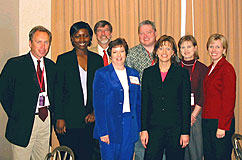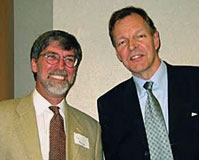U.S. Meeting of RIAS Fellows 2003
Las Vegas, April 6/7, 2003
It was the first U.S. Meeting of. RIAS Fellows after September 11, 2001, and more than 100 US alumni of the RIAS Germany programs in 2000, 2001 and 2002 attended to discuss the latest transatlantic developments and to reinforce the RIAS network of German-American broadcast journalists.
Representatives from US partner universities, which German journalists visit as part of their four-week US program, were also present at the meeting.


Dr. Lee B. Becker and Rainer Hasters
“A program such as this is more important in these difficult times than ever,” Rainer Hasters, executive director of the RIAS Berlin Kommission, told a group of about 100 journalists who had participated in the German-American exchange program who gathered in Las Vegas in April.
The American television and radio journalists should use the expertise they obtained from their two-week visits to Germany to help explain to Americans some of the reasons for the different reactions of Germans and Americans to the war in Iraq, Hasters said. The war was raging as the group met in Las Vegas for the reunion. Hasters said he felt the rift between the German and American governments over the war in Iraq, led by American forces and opposed strongly by the German government, could be healed with increased communication.
The U.S. journalists assembled at the meeting in the Las Vegas Hilton Hotel at the beginning of the annual meeting of the Radio Television News Directors Association.

Dr. Jackson Janes, Executive Director, AICGS
Watching different wars?
As soon as a missing American soldier was rescued this week in Iraq, the celebration was instantaneously breaking news on all American television stations as a success story in the two-week-old war. The news about the rescue mission came at the same time as coverage of seven dead civilian Iraqi, killed at a border checkpoint, was in the headlines. Both these victims of war have become a central part of the story. But to what degree does each contribute to a different perception of the war in the U.S. and in Germany? Recent polls show that 75% of Germans reject the war while the same number of Americans supports it. Are we watching and seeing different wars?
The vivid televised images of the attacks on Baghdad, the fighting through the cities along the way and the victims, injured and dead, can and do lend themselves to both sides of the argument over the war. In Germany, memories of bombs falling on German cities, recently underscored by new publications and magazine series on the subject, tend to merge into the perception of the war in Iraq as seen through the eyes of the civilian victims.
For the majority of Germans, the threat of a sadistic dictator in the Middle East, among several in the region, may be seen as part of the challenge to secure stability and peace in the region by engaging exactly those forces which detest that same threat. As a means to that end, war seems to be precisely the wrong tool, particularly when it appears to have a significant legitimacy deficit among those in the region and throughout the world. For most Germans, it appears that Saddam’s threat is not seen as imminent and therefore the pictures of the war now seem to represent an enormous mistaken judgment about how to deal with that threat, indeed, because it will generate even more threats in the future. Where is the evidence of weapons of mass destruction. Yet, the collective memory in Germany also points toward the necessity of confronting a danger before it becomes a catastrophe as permanently remembered in the legacy of Nazism.
In the U.S., there are also complex associations. The majority of the population now thinks in terms of those individual soldiers on the ground, embodied by the pictures of one of the lucky ones who was rescued. The 24/7-television coverage of the war with shots of the move toward Baghdad adds to a general sense of urgency to get the worst part of this war over with as quickly as possible. But that same constant exposure generates competing images surrounding the explanation for the war, be they the pictures of the burning trade towers and the Pentagon, by the fears that it can happen again, or by pictures of fighting in the streets of Iraqi cities conjuring up memories of Viet-Nam and the dangers of a long-term quagmire draining the country’s human and economic resources. So watching the war unfold provides those with confirmation of their differing expectations, no matter what they might be.
There is a serious problem ahead in dealing with these differences in perception when the military dimension of this conflict will inevitably draw to an end. How Germans and Americans reach their conclusions about the war’s results will shape the basis on which any form of cooperation in dealing with its aftermath can take place. Many in Washington and Berlin are already preparing for that.
In the past, waging wars was kept within the realm of the leaderships of countries who then ordered their countrymen into battle. Those who remained at home could hope for letters, then newspapers, radio and film reports. They depended on the leadership to say how things were going.
Today, wars and catastrophes like the WTC and Pentagon attacks are happening in real time with worldwide exposure by continual coverage making virtually everyone with access to a television an observer and with a judgment on how things are going. Germans and Americans are going to differ on this war and its outcome, among and between themselves. If we are looking at different wars now, we will find it more difficult to look at the same means to secure a post-war environment in which we all have a common stake. If that is the case across the Atlantic, it will be that much more difficult to deal with part of the world looking at a third version of this war being viewed through the lenses of Al-Jazeera received by millions in the Arab world. In the wake of World War I, one of America’s greatest journalists, Walter Lippmann, reminded us of the clash of what he called „the world outside and the pictures in our head“. In Public Opinion, Lippmann described how people process information“ We do not first see and then define; we define first and then see“. Today’s challenges are not only about leaders finding common ground; it is about entire populations trying to find a common vocabulary of vision to deal with shared dangers.
